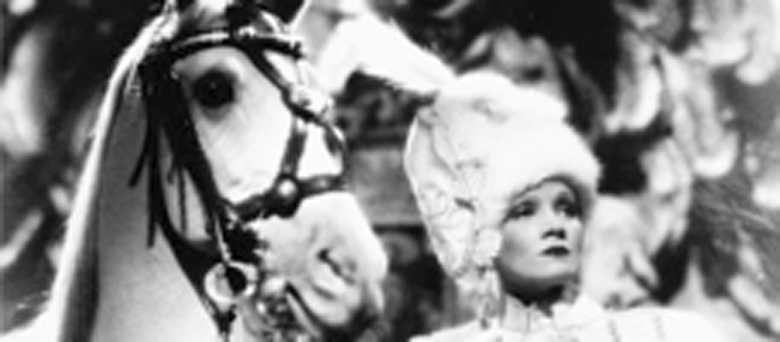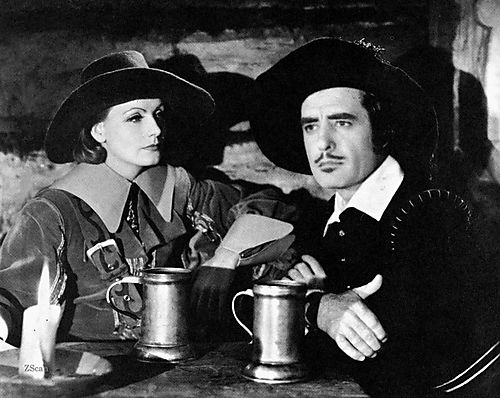Hollywood has a storied history of larger than life feuds amongst its stars, ranging from Lindsay Lohan and Hilary Duff, to Bette Davis and Joan Crawford, to Olivia de Havilland and her sister Joan Fontaine. One of the movie industry’s most legendary and mysterious rivalries is that of Greta Garbo and Marlene Dietrich. The facts behind the cause of the feud remain murky, with some claiming that the two were at odds over the affections of writer Mercedes de Acosta, while others insist that it was the result of bitterness on Garbo’s part after Dietrich began a very public affair with Garbo’s former fiancé, John Gilbert, and still others maintain that it was simply a matter of professional competition. In any case, the rivalry remains a fascinating anecdote in film history with fans still speculating about the how’s and why’s of it. This week I’ll be pitting the two queens of the silver screen against each other yet again by comparing the pair’s strikingly similar historical dramas The Scarlet Empress and Queen Christina.
 |
| She just want's to be alone, is that so much to ask?! |
1. PLOT: Both films chronicle the rise of female monarchs who were centuries ahead of the times in which they ruled, but take very different approaches to their subject matters. In The Scarlet Empress audiences are provided with an account of the early life and budding political career of Russian Empress Catherine the Great (Marlene Dietrich). The film begins with Russian envoy, Alexei (John Lodge), arriving at the Prussian court on behalf of Grand Duke Peter (Same Jaffe), who proposes a politically fueled marriage to the much younger and painfully naïve Catherine. The story then follows Catherine as she struggles to adjust to life in a strange role in a strange land filled with people who are more than a little strange. The main story arch is Catherine’s evolution from an innocent spectator to ruthless political force. While this premise sounds like it would be promising, the script consistently digresses into histrionics with characters expressing themselves with only the broadest and most overacted emotions. The lack of an emotional core in the story is exacerbated by the way in which the story focuses upon Catherine’s sexual development while largely ignoring her intellectual and political development. While Catherine the Great’s sex life is certainly an intriguing aspect of her character, the film limits its historical scope and emotional impact by turning its leading lady into a strictly sexual being whose actions are completely dominated by lust for her many lovers and spite at Alexei’s refusal of her advances.
In Queen Christina, Greta Garbo plays the less well known, but equally fascinating, Queen Christina of Sweden. The story begins with Christina assuming leadership when she is still just a child after her father is killed in battle, and then flashes ahead to the now grown Christina’s successful reign. While the film touches upon Christina’s rumored promiscuity and her past relationship with her foreign minister, Count Magnus (Ian Keith), the film focuses the majority of its time upon Christina’s struggle to balance her professional and personal lives. Throughout the film, Christina unsuccessfully tries to find time alone to maintain her individuality and sanity but is constantly interrupted by the demands of her position. Making matters even more difficult, her people demand that she marry and produce an heir as soon as possible to ensure the continuation of the royal bloodline. This is a double blow to the queen as it not only undermines her achievements (establishing peace, improving living conditions), but also forces her to choose between the independence that she so values and the will of the public she has devoted her life to serving. Rather than make the lose-lose choice between her dimwitted war-hero cousin (Reginald Owen) and the scheming Magnus, Christina instead takes a brief holiday, disguising herself as a young man to ensure her anonymity. During her trip, she meets the intelligent and charming Spanish ambassador, Don Antonio (John Gilbert), and is dismayed to find that she might have at last met her match with a man whom her people would never accept. This conflict creates a truly engaging plot arch as Christina is ultimately forced to choose between her personal passions and her civic duty. The complexity of its heroine and the nuance with of her struggle to find balance in her life makes Queen Christina a film that remains startlingly relevant and relatable to the countless women who find themselves facing a similar struggle today. For its realistic character development and the engaging journey which its heroine undergoes, Queen Christina takes the prize for better plot.
 |
| Before Equus, there was Catherine |
2. LOVE INTERESTS: In both films, the leading men are catalysts to the development of both the film’s plot and the leading lady’s character. In The Scarlett Empress, Alexei sends Catherine a slew of mixed signals as he alternates between arranging the security of her marriage and pursuing his own attraction for her. When Catherine learns that her husband is having an affair with his mistress of several years, she turns to Alexei for comfort, only to be faced with the fact that there is another woman in Alexei’s life as well; her mother in law, Empress Elizabeth (Louise Dresser). This painful realization leads Catherine to engage in a one night stand with one of the palace guards as a feeble act of retaliation and ultimately sets her on the path to becoming the cunning seductress that history has come to remember her as. While Alexei’s is portrayed as crucial in the overall story of Catherine’s development, the relationship between the two is never clearly defined. As a result, while Catherine’s schoolgirlish crush is evident, the viewer never learns if the object of her affection actually returns her feelings or merely sees her as a challenging conquest. This ambiguity is exacerbated by the interactions between the two which remain strictly superficial. As a result, it is difficult to believe that Catherine would really base the course of her future upon the rejection of a man whom she barely knew just because of an adolescent infatuation, which in turn damages the credibility of the larger story.
In Queen Christina, Antonio first meets Christina while she is disguised as a man and finds himself drawn to her quick wit and well-rounded personality. During their initial friendship, Christina is thrilled to finally spend time with someone who enjoys her company because of her personal qualities rather than her prominent position. When he finally learns of her true identity, Antonio remains unwavering and proves his love for her by pursuing their relationship despite the fact that it will likely cost him his political position. While the initial romance between the two is a whirlwind that takes place over the course of mere days, the varied, but always deep, conversations between them ensure that their connection is believable. Similarly, the film’s straightforward depiction of its love story informs audiences of the thoughts and feelings that drive the central relationship and gives viewers a reason to care about its outcome. As a result, it is easy for audiences to appreciate the full weight of Christina’s decision and empathize with her struggle to choose between her professional success and the man who could ensure her personal happiness. Through its intelligent approach to adult relationships and its use of a hero who is truly its heroine’s match, Queen Christina takes the title for most satisfying love story.
 |
| The couple who drinks together stays together |
3. LEADING LADIES: The quality of the leading ladies’ performances are both excellent within the context of their films. Dietrich somehow manages to bring a level of subtlety to her portrayal of Catherine, despite the way in which the script constantly reduces her character to cartoonish extremes. She plays both the innocent teenager that Catherine begins the film as and the hardened woman that she becomes with equal skill and credibility. Garbo also turns in a memorable performance as her conflicted queen. Unlike Dietrich, Garbo is given more to work with as Queen Christina’s script allows her character to develop naturally as the plot progresses. Garbo is also spared the task of following her character through drastic changes as Christina remains true to herself and her values throughout the story’s ups and downs. While this would seem to suggest that Garbo has the easier part to play, the complexity of Christina’s character makes her a difficult role to undertake. The script demands that Garbo demonstrate political charisma, personal frustration, and an intriguing combination of tomboy ruggedness and feminine charm, all of which she portrays with equal aplomb. As a result, it is difficult to choose between the two performances without judging them based upon your overall opinion of the films in which they are featured. Although they play two very different characters, both Garbo and Dietrich turn in excellent performances that lend complexity and genuine emotion to their characters, making this one a draw and leaving Queen Christina as the overall winner. Post your choice in the comments!
 |
| Would you like to go for a roll in the hay? |

No comments:
Post a Comment